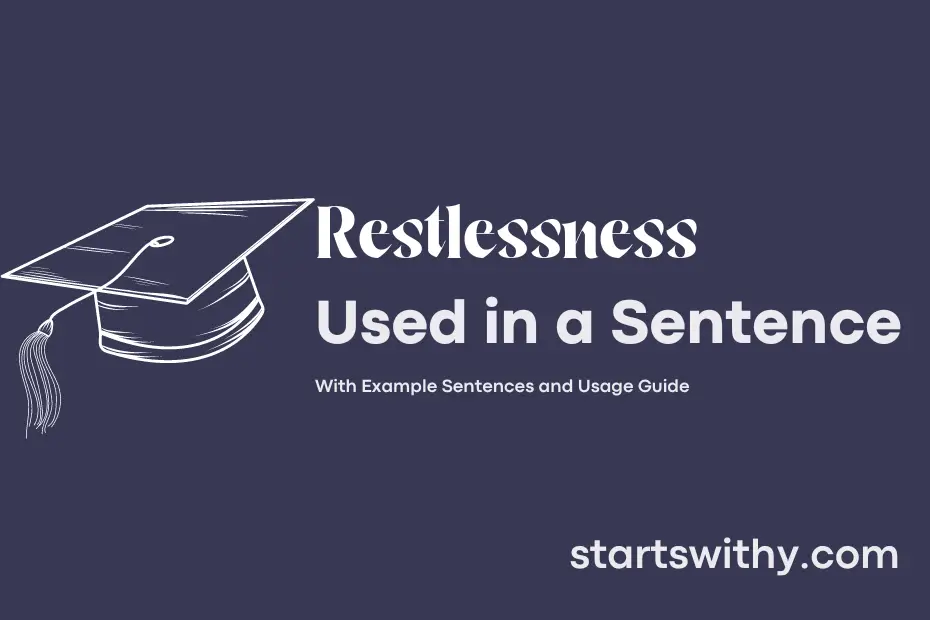Have you ever experienced that inner feeling of unease or agitation that just won’t seem to go away? This sensation is commonly known as restlessness.
Restlessness is a sense of persistent dissatisfaction or impatience that can manifest as an inability to relax or settle down. It often stems from feelings of discontentment or a lack of fulfillment, causing individuals to feel restless, anxious, or fidgety.
7 Examples Of Restlessness Used In a Sentence For Kids
- Restlessness makes it hard to sit still.
- Sometimes we feel restlessness when we want to play.
- It’s okay to feel a little restlessness when we’re excited.
- Taking a deep breath can help calm our restlessness.
- Maybe we feel restlessness when we’re waiting for something fun.
- Let’s find ways to channel our restlessness into something productive.
- Taking a short walk can help ease our restlessness.
14 Sentences with Restlessness Examples
- Restlessness hits hard when waiting for exam results.
- After pulling an all-nighter, restlessness finally sets in during the early morning lectures.
- The anticipation of a long weekend trip adds to the restlessness of the already stressed college students.
- The slow internet speed in the hostel causes a sense of restlessness among the students trying to submit assignments.
- The constant noise from the construction site nearby only adds to the restlessness of the students trying to study for their upcoming exams.
- The restrictions on campus due to COVID-19 have intensified the restlessness of the students longing for social interactions.
- The delayed start of the college festival created a sense of restlessness among the students waiting for the event to kick off.
- The announcement of a surprise quiz last minute causes restlessness among the unprepared students.
- The canteen running out of food during lunch hours leads to restlessness among hungry college students.
- The long queues at the bookstore before the start of the semester provoke a sense of restlessness among the students trying to buy their textbooks.
- The uncertainty of the future job prospects after graduation fuels restlessness among the final year students.
- The unreliability of public transport leads to restlessness among the students rushing to make it to their early morning classes.
- The constant changes in the timetable create a sense of restlessness among the students trying to plan their study schedules.
- The lack of clarity on assignment deadlines contributes to the restlessness of the students struggling to prioritize their tasks.
How To Use Restlessness in Sentences?
Restlessness can be used in a sentence to describe a feeling of unease or agitation. To use restlessness in a sentence, start by identifying a situation where someone is feeling restless or unable to relax. For example, you could say, “After drinking caffeine late in the day, he felt a sense of restlessness that kept him tossing and turning in bed.”
In this sentence, the word restlessness is used to convey the idea of the person feeling jittery or unable to calm down due to the effects of caffeine. By including restlessness in your sentence, you can help paint a vivid picture of the person’s state of mind or emotions.
When incorporating restlessness into a sentence, make sure to consider the context in which the feeling is being experienced. Is it due to physical discomfort, emotional stress, or external factors? This will help you accurately convey the intended meaning and create a more impactful sentence.
Overall, using restlessness in a sentence is a great way to express feelings of agitation or discomfort. By practicing with different scenarios and contexts, you can improve your language skills and effectively communicate your ideas to others.
Conclusion
In conclusion, the examples of sentences with restlessness illustrate a feeling of unease, agitation, or inability to stay still. This restlessness can manifest physically, mentally, or emotionally, as seen in sentences like “His constant fidgeting revealed his inner restlessness” or “She tossed and turned, unable to shake off the feeling of restlessness.” These sentences highlight the restless nature of individuals experiencing internal turmoil or a lack of peace.
Overall, the sentences with restlessness showcase a common human experience that can be caused by various factors, such as anxiety, anticipation, boredom, or discontent. By bringing attention to this emotion through language, we can better understand and empathize with those struggling with restlessness in their daily lives.



